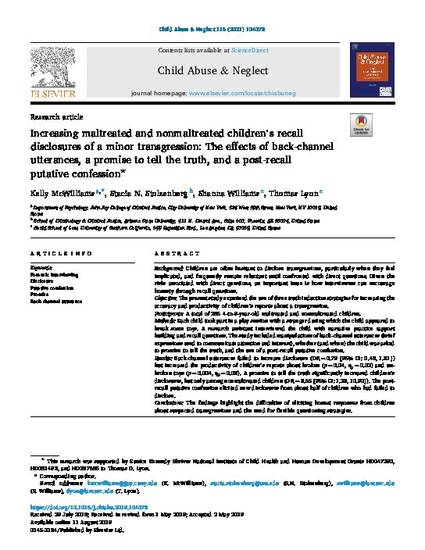
Article
68. Increasing maltreated and nonmaltreated children’s recall disclosures of a minor transgression: The effects of back-channel utterances, a promise to tell the truth and a post-recall putative confession.
Child Abuse & Neglect (Published 2021)
(2019)
Abstract
Background: Children are often hesitant to disclose transgressions, particularly when they feel implicated, and frequently remain reluctant until confronted with direct questions. Given the risks associated with direct questions, an important issue is how interviewers can encourage honesty through recall questions. Objective: The present study examined the use of three truth induction strategies for increasing the accuracy and productivity of children’s reports about a transgression. Participants: A total of 285 4-to-9-year-old maltreated and nonmaltreated children. Methods: Each child took part in a play session with a stranger during which the child appeared to break some toys. A research assistant interviewed the child with narrative practice rapport building and recall questions. The study included manipulations of back-channel utterances (brief expressions used to communicate attention and interest), whether (and when) the child was asked to promise to tell the truth, and the use of a post-recall putative confession. Results: Back-channel utterances failed to increase disclosure (OR = .79 [95% CI: .48, 1.31]) but increased the productivity of children’s reports about broken (p = .04, ηp = 0.02) and unbroken toys (p = .004, ηp = 0.03). A promise to tell the truth significantly increased children’s disclosures, but only among nonmaltreated children (OR = 3.65 [95% CI: 1.23, 10.90]). The post-recall putative confession elicited new disclosures from about half of children who had failed to disclose. Conclusions: The findings highlight the difficulties of eliciting honest responses from children about suspected transgressions and the need for flexible questioning strategies.
Keywords
- child abuse,
- child sexual abuse,
- child witness,
- child testimony,
- putative confession,
- recall disclosures
Disciplines
Publication Date
May 2, 2019
Citation Information
McWilliams, K., Stolzenberg, S.N., Williams, S., & Lyon, T.D. (2021). Increasing maltreated and nonmaltreated children’s recall disclosures of a minor transgression: The effects of back-channel utterances, a promise to tell the truth and a post-recall putative confession. Child Abuse & Neglect, 116, 104073.
